 A meeting with the authors of Tribuna Negra: Origens do Movimento Negro em Portugal (1911-1932), Cristina Roldão, José Pereira and Pedro Varela, resulted in this long conversation at BUALA.
The book presents a complex plot that neatly ties together the available information and many loose ends. As a research stance, the authors' interrogative formulation, acknowledging the limitations, leaves unanswered what we still don't know: “what have they said?”, “what have they done?”, it creates new questions and confirms how much research is yet to be done on Black Lisbon at the beginning of the 20th century. In fact, by reading the book, you get the feeling that each chapter could be another book.
A meeting with the authors of Tribuna Negra: Origens do Movimento Negro em Portugal (1911-1932), Cristina Roldão, José Pereira and Pedro Varela, resulted in this long conversation at BUALA.
The book presents a complex plot that neatly ties together the available information and many loose ends. As a research stance, the authors' interrogative formulation, acknowledging the limitations, leaves unanswered what we still don't know: “what have they said?”, “what have they done?”, it creates new questions and confirms how much research is yet to be done on Black Lisbon at the beginning of the 20th century. In fact, by reading the book, you get the feeling that each chapter could be another book.
Face to face
22.02.2025 | by Marta Lança
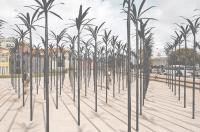 It is important that a public work (especially a memorial) does not show just one face, but that it opens up to different readings. It is a plantation in mourning, burned, which reflects the lugubrious and funerary side of the plantation. And it also pays tribute to the resistance of the enslaved by the gesture of burning the plantation and boycotting the regime of oppression. The plantation is where the process of dehumanization occurs.
It is important that a public work (especially a memorial) does not show just one face, but that it opens up to different readings. It is a plantation in mourning, burned, which reflects the lugubrious and funerary side of the plantation. And it also pays tribute to the resistance of the enslaved by the gesture of burning the plantation and boycotting the regime of oppression. The plantation is where the process of dehumanization occurs.
Face to face
19.06.2024 | by Marta Lança
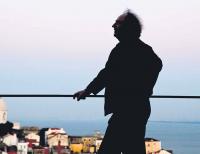 French ethnologist Jean-Yves Loude returned to the “black city” for a workshop on the figure of Lisbon in literature (you can consult the program here) and insists on counteracting the manipulation of facts that erases the African contribution to the great achievements of the world.
In Lisbon in the Black City (2003) the narrator discovered a city full of signs of this African presence and showed us this privilege as Lisbon residents.
French ethnologist Jean-Yves Loude returned to the “black city” for a workshop on the figure of Lisbon in literature (you can consult the program here) and insists on counteracting the manipulation of facts that erases the African contribution to the great achievements of the world.
In Lisbon in the Black City (2003) the narrator discovered a city full of signs of this African presence and showed us this privilege as Lisbon residents.
Face to face
16.05.2024 | by Marta Lança
 António Ole: Vital Matter gathers works from different periods of António Ole's (Luanda, 1951) multifaceted artistic journey of over fifty years. Made in various media, from sculpture to photography, from drawing to video, these works highlight the attention that Ole has devoted to nature and its vital elements and materials. The earth, water, fire and air here take on countless forms that, as a whole, invite a planetary perception and an ecological awareness not only of the cohabitation, but, above all, of the interdependence between human and non-human forms of life (animal, vegetable, mineral) – vital matter to whose urgency the pandemic itself has, more than ever, alerted us.
António Ole: Vital Matter gathers works from different periods of António Ole's (Luanda, 1951) multifaceted artistic journey of over fifty years. Made in various media, from sculpture to photography, from drawing to video, these works highlight the attention that Ole has devoted to nature and its vital elements and materials. The earth, water, fire and air here take on countless forms that, as a whole, invite a planetary perception and an ecological awareness not only of the cohabitation, but, above all, of the interdependence between human and non-human forms of life (animal, vegetable, mineral) – vital matter to whose urgency the pandemic itself has, more than ever, alerted us.
I'll visit
27.04.2021 | by Ana Balona de Oliveira
 Despite the importance of chattel slavery to the making of Portugal and its overseas empire, this terrifying history of black bondage is entirely muted in the public memory of Lisbon. In contrast to the (recently established and far overdue) National Museum of African American History and Culture in the United States or the Museu Afro Brasilin São Paulo, Brazil, there are no such museums or reckoning public memorials in Lisbon along the lines of the Mémorial de l’Abolition d’Esclavage as in Nantes, France. More recently, however, a slavery museum was established in the historic “Mercado de Escravos” (Slave Market) of the southern Portuguese port of Lagos, which is said to be the site of the first trade in enslaved Africans in Europe. Yet, Lisbon remains largely silent on its legacy of white terror and black captivity.
Despite the importance of chattel slavery to the making of Portugal and its overseas empire, this terrifying history of black bondage is entirely muted in the public memory of Lisbon. In contrast to the (recently established and far overdue) National Museum of African American History and Culture in the United States or the Museu Afro Brasilin São Paulo, Brazil, there are no such museums or reckoning public memorials in Lisbon along the lines of the Mémorial de l’Abolition d’Esclavage as in Nantes, France. More recently, however, a slavery museum was established in the historic “Mercado de Escravos” (Slave Market) of the southern Portuguese port of Lagos, which is said to be the site of the first trade in enslaved Africans in Europe. Yet, Lisbon remains largely silent on its legacy of white terror and black captivity.
City
04.02.2021 | by Yesenia Barragan
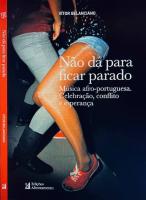 The relevance of black participation in Portugal in the most diverse areas - including music - dates back several hundred years, but is rarely articulated in dominant public narratives. It is not, of course, that blacks in Portugal have no voice or are not present in the daily life of the country. It's often about talking without being considered, seeing without being seen, singing without being listened to - at least outside a cultural sphere that tends to be more circumscribed.
The relevance of black participation in Portugal in the most diverse areas - including music - dates back several hundred years, but is rarely articulated in dominant public narratives. It is not, of course, that blacks in Portugal have no voice or are not present in the daily life of the country. It's often about talking without being considered, seeing without being seen, singing without being listened to - at least outside a cultural sphere that tends to be more circumscribed.
Stages
01.02.2021 | by Inês Nascimento Rodrigues
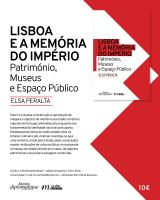 Its purpose is to analyse the several examples by which “images” related to the imperial history of Portugal are built and copied, thus being understood as a fundamental and articulating axis of the Portuguese national identity. The focus is therefore on a “image-memory” or a memory-representation, authorized by the State, by its corporation and by institutions of public culture and not so much on a memory-routine, passed on in the realm of daily social interactions, or a memory-remembrance, passed on verbally.
Its purpose is to analyse the several examples by which “images” related to the imperial history of Portugal are built and copied, thus being understood as a fundamental and articulating axis of the Portuguese national identity. The focus is therefore on a “image-memory” or a memory-representation, authorized by the State, by its corporation and by institutions of public culture and not so much on a memory-routine, passed on in the realm of daily social interactions, or a memory-remembrance, passed on verbally.
City
20.11.2018 | by Elsa Peralta
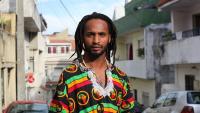 The new case, currently being heard in court, rejects the version of events previously offered by the police officers, and charges them with physical assault, aggravated kidnapping, inhumane treatment and inciting racially-motivated discrimination, hatred and violence - as well as slander, falsifying witness testimonies and falsifying documentation.
The new case, currently being heard in court, rejects the version of events previously offered by the police officers, and charges them with physical assault, aggravated kidnapping, inhumane treatment and inciting racially-motivated discrimination, hatred and violence - as well as slander, falsifying witness testimonies and falsifying documentation.
Body
05.11.2018 | by Ana Naomi de Sousa
 This paper explores Lisbon’s contemporary music scenes within the perspective of music and cultural circulation. It discusses the various ways in which music and cities interact, in a context of increased inter-connectedness between the local and the global. It suggests that music creation and performance (and more broadly, cultural innovation), cannot be reduced to neither grassroots nor institutional initiatives. On the premises of the existence of a so-called “global culture”, cities tend to reinvent themselves by promoting various (and eventually competing) self-definitions. In the case of Lisbon, this tendency is accompanied by a seemingly increased desire to connect (or re-connect) with the Lusophone world, eventually informing Lisbon’s self-images as an inclusive and multicultural city. In this process, new forms of ethnicity may gain visibility in the marketing of Luso-World music (or World music as practiced in the Portuguese-speaking countries). At the horizon of imagined cities as “transcultural megacities”, music tends to gain agency in the promotion of senses of place and belonging in, and to the city.
This paper explores Lisbon’s contemporary music scenes within the perspective of music and cultural circulation. It discusses the various ways in which music and cities interact, in a context of increased inter-connectedness between the local and the global. It suggests that music creation and performance (and more broadly, cultural innovation), cannot be reduced to neither grassroots nor institutional initiatives. On the premises of the existence of a so-called “global culture”, cities tend to reinvent themselves by promoting various (and eventually competing) self-definitions. In the case of Lisbon, this tendency is accompanied by a seemingly increased desire to connect (or re-connect) with the Lusophone world, eventually informing Lisbon’s self-images as an inclusive and multicultural city. In this process, new forms of ethnicity may gain visibility in the marketing of Luso-World music (or World music as practiced in the Portuguese-speaking countries). At the horizon of imagined cities as “transcultural megacities”, music tends to gain agency in the promotion of senses of place and belonging in, and to the city.
City
18.05.2011 | by Jorge de La Barre
 How is cosmopolitanism to be practiced, if the city persists in creating barriers between insiders and outsiders? If traditional boroughs of Lisbon are inhabited by recent immigrants, they are easily fixed into specific territories, such as Martim Moniz, Praça de S. Domingo or Restauradores, some parts of Alfama, former Jewish and Moorish ‘ghettos’, a testimony to the ever permanent ‘multicultural’ character of the city, as well as its more tolerant and racist moments.
How is cosmopolitanism to be practiced, if the city persists in creating barriers between insiders and outsiders? If traditional boroughs of Lisbon are inhabited by recent immigrants, they are easily fixed into specific territories, such as Martim Moniz, Praça de S. Domingo or Restauradores, some parts of Alfama, former Jewish and Moorish ‘ghettos’, a testimony to the ever permanent ‘multicultural’ character of the city, as well as its more tolerant and racist moments.
City
13.05.2010 | by Manuela Ribeiro Sanches
 A meeting with the authors of Tribuna Negra: Origens do Movimento Negro em Portugal (1911-1932), Cristina Roldão, José Pereira and Pedro Varela, resulted in this long conversation at BUALA.
The book presents a complex plot that neatly ties together the available information and many loose ends. As a research stance, the authors' interrogative formulation, acknowledging the limitations, leaves unanswered what we still don't know: “what have they said?”, “what have they done?”, it creates new questions and confirms how much research is yet to be done on Black Lisbon at the beginning of the 20th century. In fact, by reading the book, you get the feeling that each chapter could be another book.
A meeting with the authors of Tribuna Negra: Origens do Movimento Negro em Portugal (1911-1932), Cristina Roldão, José Pereira and Pedro Varela, resulted in this long conversation at BUALA.
The book presents a complex plot that neatly ties together the available information and many loose ends. As a research stance, the authors' interrogative formulation, acknowledging the limitations, leaves unanswered what we still don't know: “what have they said?”, “what have they done?”, it creates new questions and confirms how much research is yet to be done on Black Lisbon at the beginning of the 20th century. In fact, by reading the book, you get the feeling that each chapter could be another book.  It is important that a public work (especially a memorial) does not show just one face, but that it opens up to different readings. It is a plantation in mourning, burned, which reflects the lugubrious and funerary side of the plantation. And it also pays tribute to the resistance of the enslaved by the gesture of burning the plantation and boycotting the regime of oppression. The plantation is where the process of dehumanization occurs.
It is important that a public work (especially a memorial) does not show just one face, but that it opens up to different readings. It is a plantation in mourning, burned, which reflects the lugubrious and funerary side of the plantation. And it also pays tribute to the resistance of the enslaved by the gesture of burning the plantation and boycotting the regime of oppression. The plantation is where the process of dehumanization occurs.  French ethnologist Jean-Yves Loude returned to the “black city” for a workshop on the figure of Lisbon in literature (you can consult the program here) and insists on counteracting the manipulation of facts that erases the African contribution to the great achievements of the world.
In Lisbon in the Black City (2003) the narrator discovered a city full of signs of this African presence and showed us this privilege as Lisbon residents.
French ethnologist Jean-Yves Loude returned to the “black city” for a workshop on the figure of Lisbon in literature (you can consult the program here) and insists on counteracting the manipulation of facts that erases the African contribution to the great achievements of the world.
In Lisbon in the Black City (2003) the narrator discovered a city full of signs of this African presence and showed us this privilege as Lisbon residents.  António Ole: Vital Matter gathers works from different periods of António Ole's (Luanda, 1951) multifaceted artistic journey of over fifty years. Made in various media, from sculpture to photography, from drawing to video, these works highlight the attention that Ole has devoted to nature and its vital elements and materials. The earth, water, fire and air here take on countless forms that, as a whole, invite a planetary perception and an ecological awareness not only of the cohabitation, but, above all, of the interdependence between human and non-human forms of life (animal, vegetable, mineral) – vital matter to whose urgency the pandemic itself has, more than ever, alerted us.
António Ole: Vital Matter gathers works from different periods of António Ole's (Luanda, 1951) multifaceted artistic journey of over fifty years. Made in various media, from sculpture to photography, from drawing to video, these works highlight the attention that Ole has devoted to nature and its vital elements and materials. The earth, water, fire and air here take on countless forms that, as a whole, invite a planetary perception and an ecological awareness not only of the cohabitation, but, above all, of the interdependence between human and non-human forms of life (animal, vegetable, mineral) – vital matter to whose urgency the pandemic itself has, more than ever, alerted us.  Despite the importance of chattel slavery to the making of Portugal and its overseas empire, this terrifying history of black bondage is entirely muted in the public memory of Lisbon. In contrast to the (recently established and far overdue) National Museum of African American History and Culture in the United States or the Museu Afro Brasilin São Paulo, Brazil, there are no such museums or reckoning public memorials in Lisbon along the lines of the Mémorial de l’Abolition d’Esclavage as in Nantes, France. More recently, however, a slavery museum was established in the historic “Mercado de Escravos” (Slave Market) of the southern Portuguese port of Lagos, which is said to be the site of the first trade in enslaved Africans in Europe. Yet, Lisbon remains largely silent on its legacy of white terror and black captivity.
Despite the importance of chattel slavery to the making of Portugal and its overseas empire, this terrifying history of black bondage is entirely muted in the public memory of Lisbon. In contrast to the (recently established and far overdue) National Museum of African American History and Culture in the United States or the Museu Afro Brasilin São Paulo, Brazil, there are no such museums or reckoning public memorials in Lisbon along the lines of the Mémorial de l’Abolition d’Esclavage as in Nantes, France. More recently, however, a slavery museum was established in the historic “Mercado de Escravos” (Slave Market) of the southern Portuguese port of Lagos, which is said to be the site of the first trade in enslaved Africans in Europe. Yet, Lisbon remains largely silent on its legacy of white terror and black captivity.  The relevance of black participation in Portugal in the most diverse areas - including music - dates back several hundred years, but is rarely articulated in dominant public narratives. It is not, of course, that blacks in Portugal have no voice or are not present in the daily life of the country. It's often about talking without being considered, seeing without being seen, singing without being listened to - at least outside a cultural sphere that tends to be more circumscribed.
The relevance of black participation in Portugal in the most diverse areas - including music - dates back several hundred years, but is rarely articulated in dominant public narratives. It is not, of course, that blacks in Portugal have no voice or are not present in the daily life of the country. It's often about talking without being considered, seeing without being seen, singing without being listened to - at least outside a cultural sphere that tends to be more circumscribed.  Its purpose is to analyse the several examples by which “images” related to the imperial history of Portugal are built and copied, thus being understood as a fundamental and articulating axis of the Portuguese national identity. The focus is therefore on a “image-memory” or a memory-representation, authorized by the State, by its corporation and by institutions of public culture and not so much on a memory-routine, passed on in the realm of daily social interactions, or a memory-remembrance, passed on verbally.
Its purpose is to analyse the several examples by which “images” related to the imperial history of Portugal are built and copied, thus being understood as a fundamental and articulating axis of the Portuguese national identity. The focus is therefore on a “image-memory” or a memory-representation, authorized by the State, by its corporation and by institutions of public culture and not so much on a memory-routine, passed on in the realm of daily social interactions, or a memory-remembrance, passed on verbally.  The new case, currently being heard in court, rejects the version of events previously offered by the police officers, and charges them with physical assault, aggravated kidnapping, inhumane treatment and inciting racially-motivated discrimination, hatred and violence - as well as slander, falsifying witness testimonies and falsifying documentation.
The new case, currently being heard in court, rejects the version of events previously offered by the police officers, and charges them with physical assault, aggravated kidnapping, inhumane treatment and inciting racially-motivated discrimination, hatred and violence - as well as slander, falsifying witness testimonies and falsifying documentation.  This paper explores Lisbon’s contemporary music scenes within the perspective of music and cultural circulation. It discusses the various ways in which music and cities interact, in a context of increased inter-connectedness between the local and the global. It suggests that music creation and performance (and more broadly, cultural innovation), cannot be reduced to neither grassroots nor institutional initiatives. On the premises of the existence of a so-called “global culture”, cities tend to reinvent themselves by promoting various (and eventually competing) self-definitions. In the case of Lisbon, this tendency is accompanied by a seemingly increased desire to connect (or re-connect) with the Lusophone world, eventually informing Lisbon’s self-images as an inclusive and multicultural city. In this process, new forms of ethnicity may gain visibility in the marketing of Luso-World music (or World music as practiced in the Portuguese-speaking countries). At the horizon of imagined cities as “transcultural megacities”, music tends to gain agency in the promotion of senses of place and belonging in, and to the city.
This paper explores Lisbon’s contemporary music scenes within the perspective of music and cultural circulation. It discusses the various ways in which music and cities interact, in a context of increased inter-connectedness between the local and the global. It suggests that music creation and performance (and more broadly, cultural innovation), cannot be reduced to neither grassroots nor institutional initiatives. On the premises of the existence of a so-called “global culture”, cities tend to reinvent themselves by promoting various (and eventually competing) self-definitions. In the case of Lisbon, this tendency is accompanied by a seemingly increased desire to connect (or re-connect) with the Lusophone world, eventually informing Lisbon’s self-images as an inclusive and multicultural city. In this process, new forms of ethnicity may gain visibility in the marketing of Luso-World music (or World music as practiced in the Portuguese-speaking countries). At the horizon of imagined cities as “transcultural megacities”, music tends to gain agency in the promotion of senses of place and belonging in, and to the city.  How is cosmopolitanism to be practiced, if the city persists in creating barriers between insiders and outsiders? If traditional boroughs of Lisbon are inhabited by recent immigrants, they are easily fixed into specific territories, such as Martim Moniz, Praça de S. Domingo or Restauradores, some parts of Alfama, former Jewish and Moorish ‘ghettos’, a testimony to the ever permanent ‘multicultural’ character of the city, as well as its more tolerant and racist moments.
How is cosmopolitanism to be practiced, if the city persists in creating barriers between insiders and outsiders? If traditional boroughs of Lisbon are inhabited by recent immigrants, they are easily fixed into specific territories, such as Martim Moniz, Praça de S. Domingo or Restauradores, some parts of Alfama, former Jewish and Moorish ‘ghettos’, a testimony to the ever permanent ‘multicultural’ character of the city, as well as its more tolerant and racist moments. 